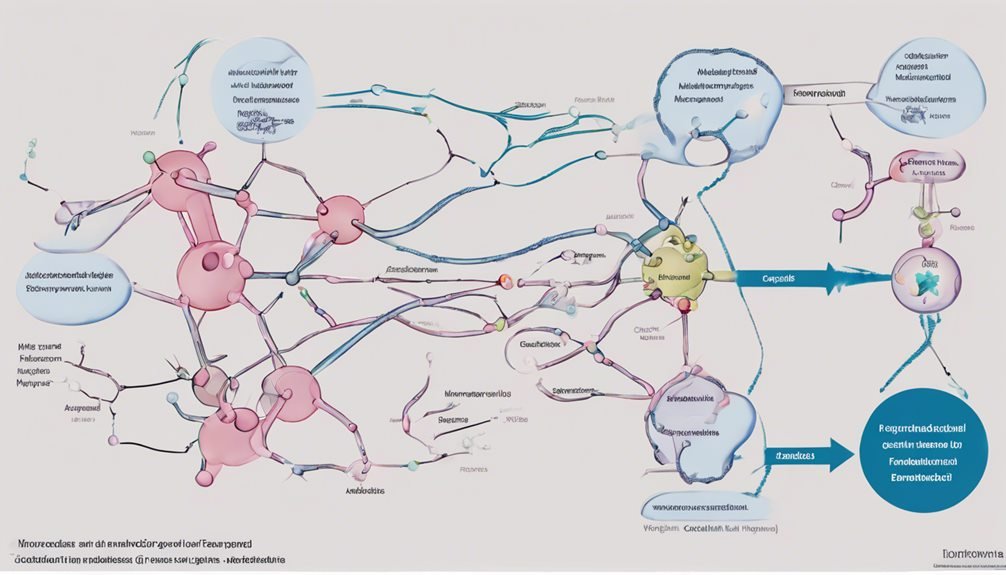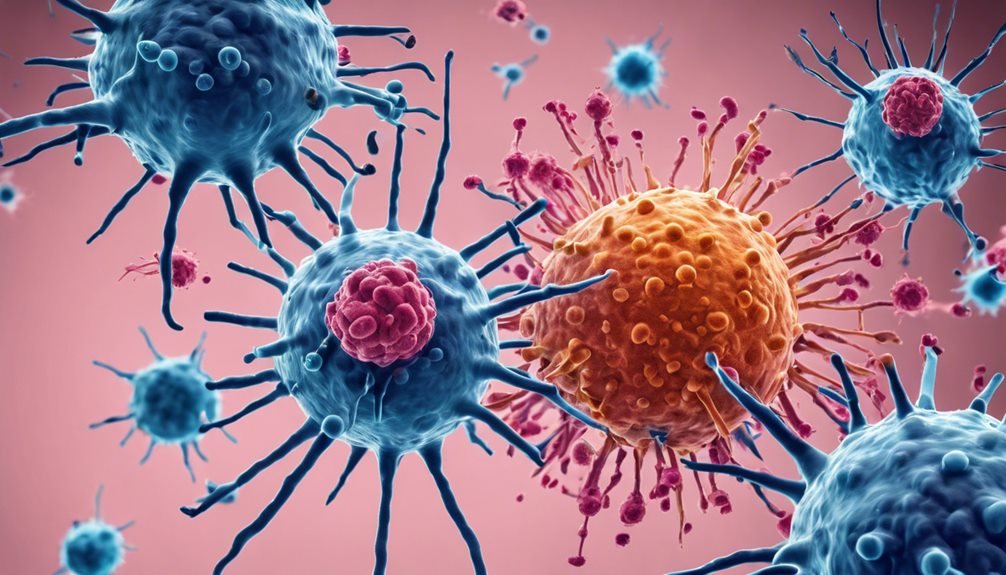When considering the intricate mechanisms through which Fenbendazole operates as an anti-cancer agent, you may be intrigued by its multifaceted approach that impacts various cellular processes. By scrutinizing the pathways it targets, a deeper understanding of how this compound disrupts cancer cells emerges, shedding light on its potential as a promising therapeutic option.
Key Takeaways
- Inhibits tubulin polymerization, disrupting cell division and halting cancer cell growth.
- Disrupts mitosis, causing errors in cell division and leading to cell death.
- Induces apoptosis in cancer cells, triggering cell dismantling.
- Modulates autophagy, enhancing sensitivity to cancer therapies and preventing survival mechanisms.
- Targets multiple pathways, inhibiting tumor growth, disrupting metabolism, and enhancing anti-cancer therapies.
Overview of Fenbendazole Mechanism
Fenbendazole, a broad-spectrum benzimidazole anthelmintic drug, is known for its effectiveness in treating various parasitic infections in animals. In recent studies, its potential clinical applications have expanded to include anti-cancer properties. Fenbendazole exerts its effects by targeting specific molecular pathways within cancer cells, offering a novel approach to cancer treatment.
One of the key clinical applications of fenbendazole in cancer therapy is its ability to inhibit tumor growth and induce cancer cell death. This is achieved through its interaction with molecular targets such as tubulin, which plays a crucial role in cell division. By disrupting tubulin polymerization, fenbendazole interferes with the formation of the mitotic spindle, ultimately leading to cell cycle arrest and apoptosis in cancer cells.
Furthermore, fenbendazole has been shown to exhibit anti-proliferative effects by modulating various signaling pathways involved in cancer progression. By targeting specific molecular mechanisms, fenbendazole holds promise as a potential therapeutic agent for the treatment of various types of cancer.
Inhibition of Tubulin Polymerization
Targeting tubulin polymerization is a critical mechanism in disrupting cancer cell division and growth. Tubulin, a protein essential for cell division, plays a vital role in forming the structural framework of the cell during mitosis. Fenbendazole, an anthelmintic drug, exerts its anti-cancer effects by inhibiting tubulin polymerization. By targeting tubulin, fenbendazole interferes with the assembly of microtubules, the dynamic structures involved in cell division. This disruption leads to the inhibition of cancer cell proliferation and induces cell death.
Polymerization inhibition by fenbendazole prevents the formation of the spindle apparatus, crucial for proper chromosome segregation during cell division. As a result, cancer cells are unable to accurately divide, leading to cell cycle arrest and ultimately cell death.
By interfering with tubulin dynamics, fenbendazole effectively halts the uncontrolled growth of cancer cells.
Understanding the significance of tubulin targeting and polymerization inhibition sheds light on the intricate mechanisms through which fenbendazole exerts its anti-cancer effects, offering hope for novel therapeutic strategies against cancer.
Disruption of Mitosis
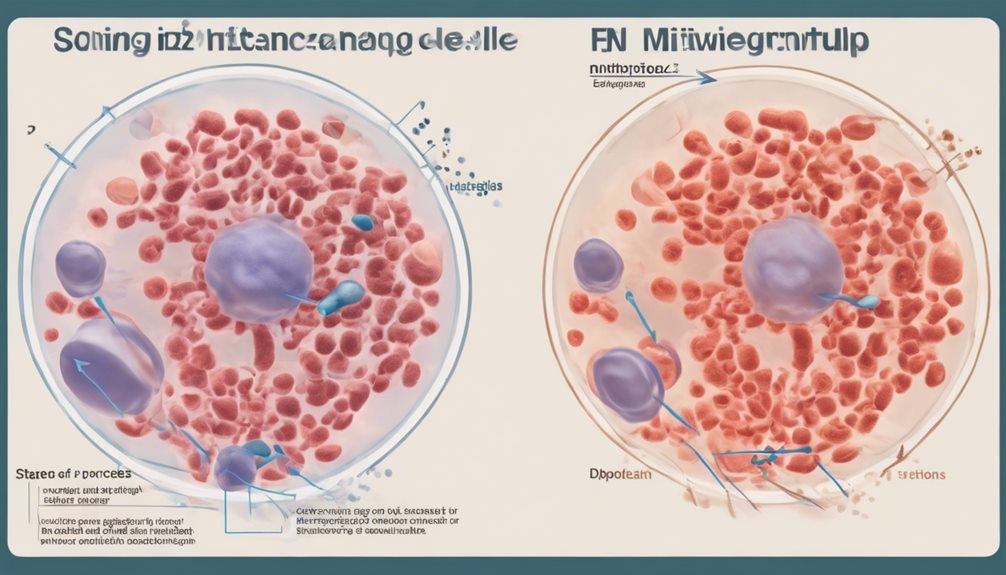
To disrupt mitosis, cells must undergo a series of precisely orchestrated events that ensure accurate chromosome segregation and cell division. Mitosis is a crucial process in which a single cell divides into two identical daughter cells. One of the key players in mitosis is the mitotic spindle, a structure composed of microtubules responsible for aligning and separating chromosomes during cell division.
Fenbendazole disrupts mitosis by interfering with the formation and function of the mitotic spindle. By inhibiting tubulin polymerization, a process essential for the assembly of microtubules in the spindle, fenbendazole prevents the proper alignment and segregation of chromosomes. This disruption leads to errors in cell division, ultimately causing cell death or preventing the growth of cancer cells.
Understanding the intricate details of how fenbendazole disrupts mitosis sheds light on its mechanism of action in inhibiting cancer cell proliferation. By targeting the fundamental processes of cell division, fenbendazole offers a promising approach in combating cancer.
Induction of Apoptosis
Disrupting mitosis through interference with the mitotic spindle is just one aspect of fenbendazole's anti-cancer mechanism. In addition to this, fenbendazole plays a crucial role in inducing apoptosis in cancer cells.
Apoptosis, or programmed cell death, is a tightly regulated process essential for maintaining tissue homeostasis and eliminating damaged or abnormal cells.
Fenbendazole influences apoptosis regulation by activating intrinsic pathways within cancer cells. By targeting specific signaling molecules and proteins involved in cell death mechanisms, fenbendazole triggers a cascade of events that lead to the orderly dismantling of the cancer cell. This process helps in preventing the uncontrolled growth and spread of cancer cells.
Through the induction of apoptosis, fenbendazole effectively eliminates cancer cells while minimizing damage to surrounding healthy tissues. Understanding how fenbendazole modulates apoptosis regulation provides valuable insights into its anti-cancer properties and highlights its potential as a therapeutic agent in combating various forms of cancer.
Regulation of Autophagy
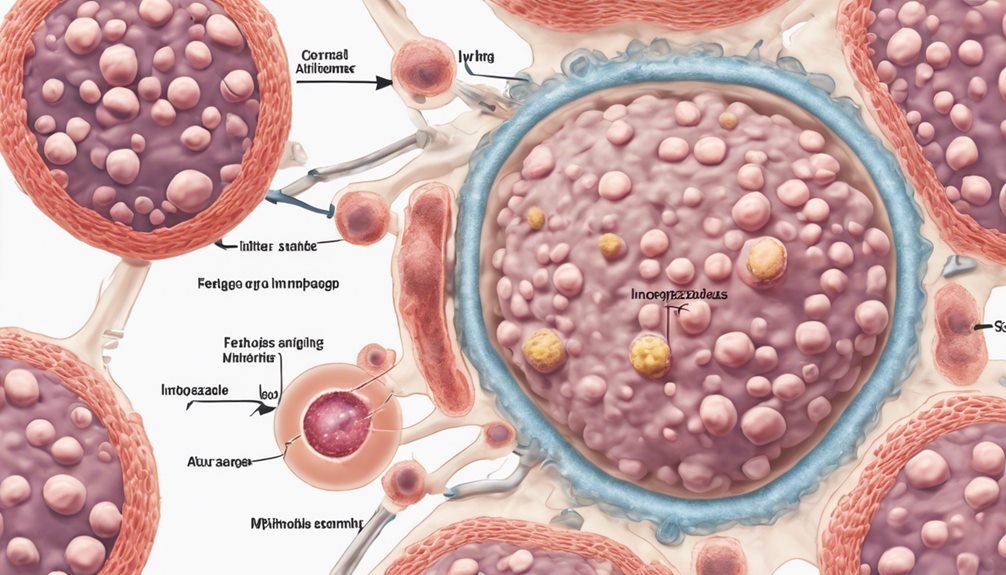
Autophagy, a cellular process crucial for maintaining cellular homeostasis and responding to various stress conditions, is intricately regulated by fenbendazole in the context of its anti-cancer mechanisms. Autophagy regulation plays a significant role in cancer therapy, as it can either promote cell survival by recycling cellular components or lead to cell death, depending on the context. Fenbendazole has been found to modulate autophagy in cancer cells, influencing the balance between cell survival and death.
Through its regulatory effects on autophagy, fenbendazole can enhance the sensitivity of cancer cells to treatments, such as chemotherapy or radiation therapy. By inducing autophagy, fenbendazole can help in eliminating damaged organelles and proteins, thus preventing the survival and proliferation of cancer cells.
Additionally, fenbendazole's ability to regulate autophagy can also contribute to reducing the development of resistance mechanisms often encountered in cancer therapy.
Understanding the impact of fenbendazole on autophagy regulation provides valuable insights into its anti-cancer properties and highlights its potential as a therapeutic agent in combating cancer.
Impact on Cell Cycle Progression
Fenbendazole's impact on cell cycle progression is a critical aspect of its anti-cancer mechanisms. Within the complex landscape of cancer development, cell cycle regulation plays a key role in controlling cell division mechanisms. Fenbendazole has shown promise in influencing cell cycle progression, offering therapeutic potential in combating cancer.
By targeting the cell cycle, Fenbendazole interferes with the orderly sequence of events that a cell undergoes to divide and proliferate. This disruption can lead to inhibited cancer cell growth and potentially induce cell death. Understanding how Fenbendazole impacts the cell cycle provides insights into its mechanism of action against cancer cells.
Research has indicated that Fenbendazole may affect various checkpoints in the cell cycle, influencing the decision-making processes that determine whether a cell should continue dividing or undergo apoptosis. By modulating these regulatory pathways, Fenbendazole shows promise in halting uncontrolled cell division in cancer cells, highlighting its potential as a valuable tool in cancer treatment strategies.
Modulation of Wnt Signaling Pathway
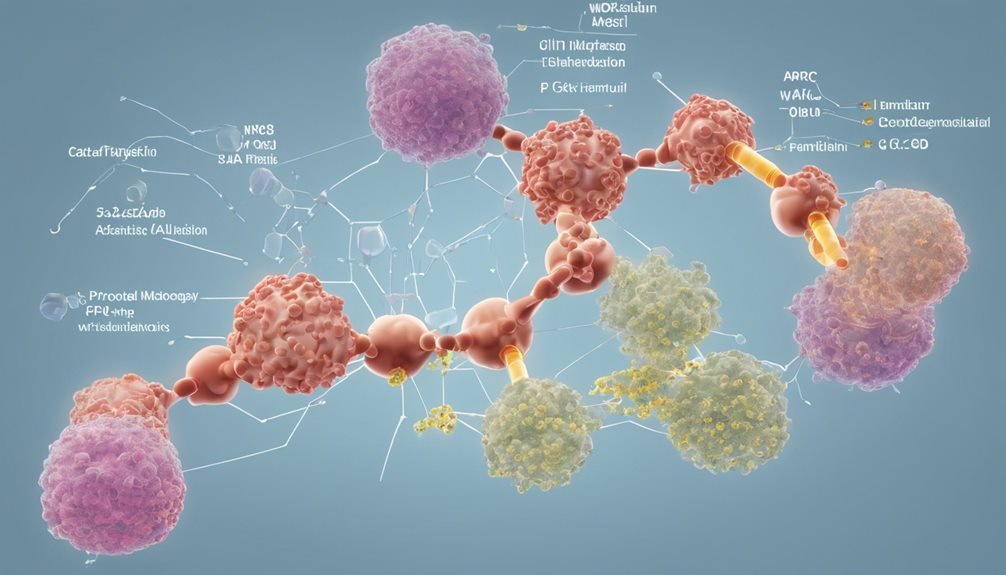
Within the realm of cancer biology, the modulation of the Wnt signaling pathway stands out as a crucial area of study. This pathway plays a fundamental role in cell proliferation, differentiation, and migration, making it a key player in cancer development. By understanding how Fenbendazole affects the Wnt signaling pathway, researchers are uncovering promising avenues for cancer prevention and therapeutic implications.
| Wnt Signaling Pathway Modulation with Fenbendazole | Effects |
|---|---|
| Inhibition of Wnt ligands secretion | Decreased cell proliferation |
| Suppression of β-catenin nuclear translocation | Inhibition of tumor growth |
| Downregulation of Wnt target genes | Induction of cancer cell death |
Inhibition of Glucose Uptake
By targeting glucose uptake, Fenbendazole displays a multifaceted approach in impeding cancer progression. Glucose metabolism plays a crucial role in fueling cancer cells, allowing them to grow and divide rapidly. Fenbendazole disrupts this process by inhibiting the uptake of glucose by cancer cells, leading to a decrease in their energy supply and hindering their ability to proliferate.
Cancer cells have a higher demand for glucose compared to normal cells, a phenomenon known as the Warburg effect. By interfering with glucose uptake, Fenbendazole disrupts this metabolic preference of cancer cells, creating a hostile environment for their growth and survival.
This inhibition of glucose uptake ultimately contributes to slowing down cancer progression and reducing tumor growth.
Targeting of Tumor Metabolism
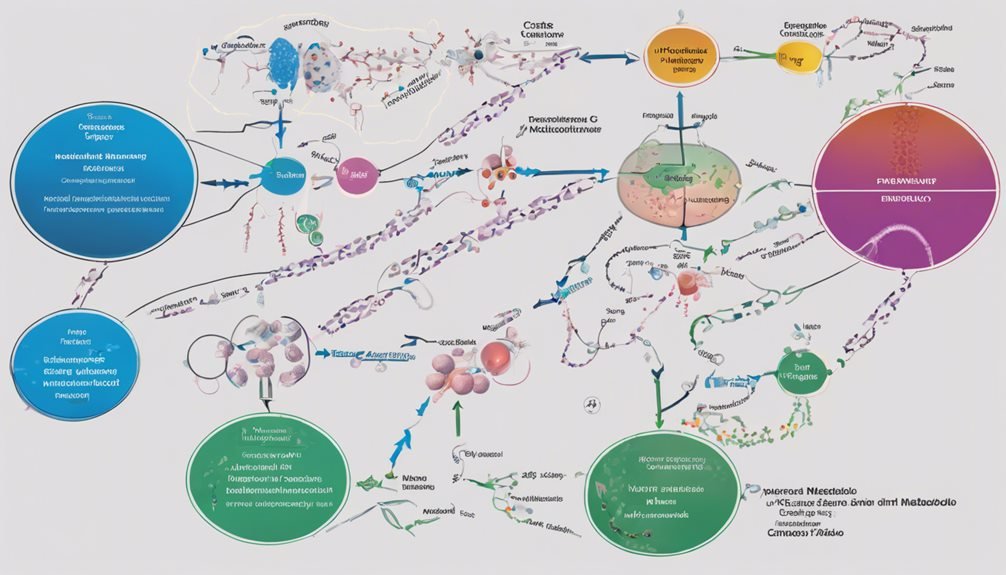
Targeting tumor metabolism involves a strategic approach to disrupt the unique metabolic pathways utilized by cancer cells for their growth and survival. Cancer cells exhibit metabolic reprogramming, altering their energy production and utilization to support rapid proliferation. By focusing on tumor metabolism, treatments like Fenbendazole aim to interfere with these specific pathways, impairing cancer cells' ability to sustain their growth.
The tumor microenvironment plays a crucial role in metabolic reprogramming, providing cancer cells with the necessary conditions for their aberrant metabolism. Targeting tumor metabolism with Fenbendazole may disrupt this supportive environment, creating a hostile atmosphere for cancer cells to thrive.
Understanding the intricate relationship between metabolic reprogramming and the tumor microenvironment is essential for developing effective anti-cancer therapies like Fenbendazole. By specifically targeting these metabolic vulnerabilities, treatments can potentially limit the growth and survival of cancer cells, offering promising avenues for combating this complex disease.
Interference With Microtubule Dynamics
Interfering with microtubule dynamics is a critical mechanism employed in cancer treatment to disrupt cell division and inhibit tumor growth. Microtubules are essential components of the cell's cytoskeleton, involved in crucial processes like cell division and intracellular transport. In cancer cells, microtubule dysfunction can lead to uncontrolled cell division, contributing to tumor growth.
By targeting microtubule dynamics, Fenbendazole disrupts the spindle apparatus during cell division, preventing proper chromosome segregation and ultimately leading to cell death. This interference with microtubules makes cancer cells more vulnerable compared to normal cells, as their rapid division rate makes them heavily reliant on intact microtubules for their growth and survival.
The disruption of microtubule dynamics by Fenbendazole creates a significant impact on cancer cell viability, making it a promising approach in cancer therapy. Understanding this mechanism sheds light on how targeting microtubules can be an effective strategy to combat cancer growth and progression.
Inhibition of Tumor Growth Factors
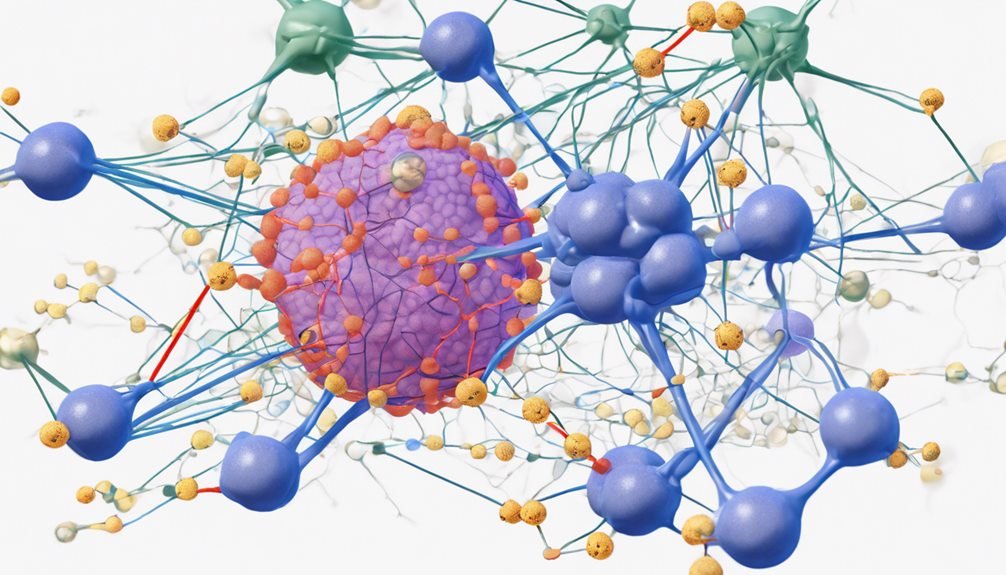
Inhibiting tumor growth factors plays a crucial role in cancer treatment by disrupting the signaling pathways that promote the proliferation and survival of cancer cells. Growth factor inhibition prevents cancer cells from receiving the signals necessary for their growth and spread. By targeting specific growth factors that support tumor progression, such as epidermal growth factor (EGF) or vascular endothelial growth factor (VEGF), fenbendazole can hinder the ability of cancer cells to thrive.
Clinical implications of growth factor inhibition involve the potential for targeted therapy, where treatments are tailored to block specific growth factors that are overexpressed in certain types of cancer. This personalized approach can lead to more effective and less toxic treatments for patients.
Future research opportunities in this area include exploring novel ways to combine growth factor inhibitors with other targeted therapies to enhance their efficacy against different types of cancer. By delving deeper into the mechanisms of growth factor inhibition, researchers aim to uncover new strategies to combat cancer and improve patient outcomes.
Potential Synergy With Other Treatments
Continuing the exploration of fenbendazole's potential in cancer treatment, it's important to consider the concept of synergy with other treatments. Combination therapies, involving fenbendazole alongside traditional chemotherapy or immunotherapy, could offer enhanced efficacy in combating cancer. Research suggests that fenbendazole may complement existing treatment options by targeting cancer cells through different mechanisms than standard therapies.
By combining fenbendazole with other treatments, there's a possibility of achieving a synergistic effect where the combined action is greater than the sum of individual effects.
When considering treatment options, it's crucial to evaluate the potential benefits of combining fenbendazole with existing therapies. This approach could lead to improved outcomes for cancer patients by targeting multiple pathways involved in tumor growth and progression. Additionally, the use of combination therapies may help reduce the development of drug resistance and enhance the overall effectiveness of cancer treatment regimens.
As research in this area continues to evolve, exploring the synergistic effects of fenbendazole with other treatments holds promise for advancing cancer care.
Frequently Asked Questions
Can Fenbendazole Be Used as a Standalone Cancer Treatment?
Fenbendazole alone may not be sufficient as a standalone cancer treatment. Combination therapies are typically more effective in targeting cancer from different angles. Using fenbendazole alongside conventional treatments or other complementary therapies may yield better results.
Long-term effects of using fenbendazole alone for cancer treatment are still being studied, so it's important to consult with healthcare professionals to determine the most suitable treatment plan for your specific condition.
Are There Any Known Side Effects of Fenbendazole in Cancer Patients?
You may experience mild gastrointestinal discomfort, such as nausea or diarrhea, when taking fenbendazole as a cancer treatment. However, long-term effects in cancer patients aren't well-documented due to limited studies. Patient tolerance varies, with some individuals reporting no side effects while others may have more difficulty.
It's crucial to monitor any changes and communicate openly with your healthcare provider to ensure your well-being during treatment.
What Is the Recommended Dosage of Fenbendazole for Cancer Treatment?
For cancer treatment, the recommended dosage of fenbendazole varies depending on individual factors like weight and cancer stage. Optimal dosing typically ranges from 3 to 5 mg per kilogram of body weight per day. This dosage has shown promising treatment efficacy in some cancer patients.
It's crucial to consult with your healthcare provider to determine the most suitable dosage of fenbendazole for your specific condition and needs.
Does Fenbendazole Interact With Other Medications or Supplements?
When considering fenbendazole, it's crucial to explore potential drug interactions and supplement compatibility. Understanding how fenbendazole interacts with other medications or supplements can help you manage your treatment effectively.
Be sure to consult with your healthcare provider or pharmacist to ensure that fenbendazole doesn't interfere with any other medications you're taking or supplements you're using. This precaution can help optimize your cancer treatment plan and overall well-being.
Is Fenbendazole Effective Against All Types of Cancer?
Fenbendazole shows promise in combating specific cancers, but its effectiveness varies. Research suggests it may influence certain cancer types by targeting microtubules and inhibiting cancer cell growth. However, its mechanisms aren't universally effective against all types of cancer.
Understanding the specific cancers fenbendazole may be effective against and the intricate mechanisms involved is crucial when considering its potential as a cancer treatment option.
Conclusion
In conclusion, Fenbendazole's diverse anti-cancer mechanisms, akin to a multi-faceted sword slashing through malignant cells, make it a promising targeted therapy. From inhibiting tubulin polymerization to regulating autophagy and targeting tumor metabolism, Fenbendazole creates a hostile environment for cancer cells. Its potential synergy with other treatments further enhances its efficacy in combating cancer. The intricate dance of molecular pathways orchestrated by Fenbendazole highlights its potential as a powerful weapon in the fight against cancer.
